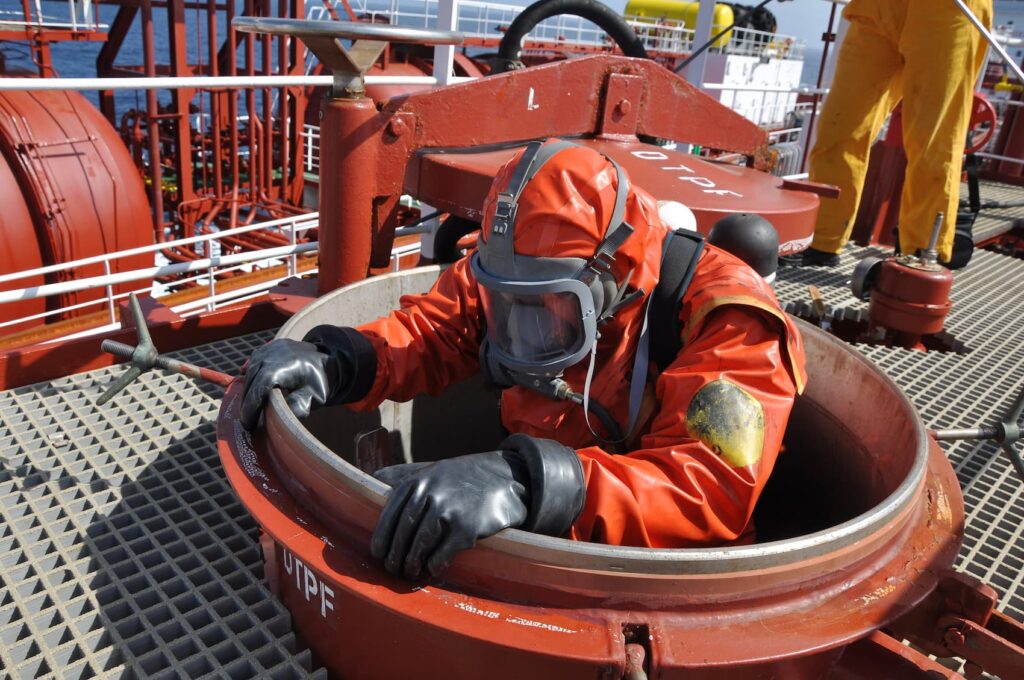Benzene Occupations
Occupations with Benzene Exposure
Occupations with Benzene Exposure: Exposure in the work place to benzene may cause AML- acute myelogenous leukemia. While benzene has been banned in the United States for almost 30 years, workers are still exposed to significant amounts of benzene when working with refined petroleum products and chemicals, including Aromatic Hydrocarbons, Exposures, Crude Oil, Naphtha, Naphthalene, Toluene, Xylene, Gasoline, Jet Fuel and Aviation Fuels. Most workers come into contact with benzene by breathing it into their lungs or absorbing it through their skin (dermal contact) when working with solvents.

High-Risk Benzene Exposure Jobs
- Adhesive production
- Aircraft engine and fuel workers
- Aviation Gasoline workers
- Automotive mechanics
- Barge / tug workers
- Boat and vessel seamen
- Brake technicians
- Chemical plant workers
- Dental Lab and Denture Adhesive workers
- Engine and turbine workers
- Gasoline & Jet Fuel distribution workers
- House painters
- Industrial plant workers (solvents)
- Jet Fuel Mechanics and truck drivers
- Maritime offshore & dock workers
- Newspaper press workers
- Painters (marine, industrial and auto)
- Paper and pulp
- Pesticide manufacturing workers
- Pipefitters welders
- Printers and print shop employees
- Railroad workers and mechanics
- Oil Refinery & Petrochemical Plant Workers
- Rubber workers
- Shoe/leather workers
- Solvent workers
- Synthetic rubber production
- Tankermen
- Truck drivers
- Adhesive Makers
- Airplane Dope Makers
- Alcohol Workers
- Aniline Makers
- Art Glass Workers
- Artificial Leather Makers
- Asbestos Product Impregnators
- Asphalt Mixers
- Automotive Workers
- Battery (Dry) Makers
- Belt Scourers
- Brakelining Maker
- Bronzers
- Burnishers
- Can Makers
- Carbolic Acid Makers
- Cast Scrubbers
- Chemical Synthesis
- Clutch Disc
- Impregnators
- Coal Tar Workers/Refineries
- Cobblers
- Coke Oven Workers
- DDT Makers
- Degreasers
- Detergent Makers
- Disinfectant Makers
- Drug Makers
- Dry Cleaners
- Dye Makers
- Electroplaters
- Enamelers
- Engravers
- Explosive Makers
- Fabric Dyers
- Feather Workers
- Fuel Handlers
- Fumigant Makers
- Fungicide Makers
- Furniture Finishers
- Gas Workers
- Glue Makers
- Hair Dressers
- Herbicide Makers
- Histology Techs
- Hydrochloric Acid Workers
- Ink Makers
- Insecticide Makers
- Lacquer Makers
- Leather Makers
- Linoleum Makers
- Lithographers
- Maleic Acid Makers
- Millinery Worker
- Mirror Silverers
- Mordanters
- Oil Processors
- Oilcloth Maters
- Organic Chemical
- Synthesizers
- Paint Makers
- Painters
- Paraffin Processors
- Pencil Makers
- Perfume Makers
- Petrochemical
- Workers
- Pharmaceutical
- Workers
- Photographic
- Chemical Makers
- Picric Acid Makers
- Polish Makers
- Pottery Decorators
- Printers
- Putty Makers
- Rubber Reclaimers
- Resin Makers
- Respirator Makers
- Rotogravure
- Printers
- Rubber Cementers
- Rubber Gasket Makers
- Rubber Makers
- Shellac Makers
- Shoe Factory Workers
- Shoe Finishers
- Soap Makers
- Solvent Makers
Stainers - Styrene Makers
- Tobacco Seedling Treaters
- Type Cleaners
- Varnish Makers
- Vulcanizers
- Wax Makers
Benzene Exposure Side Effects
Breathing very high levels of benzene can result in death. High levels of benzene exposure can cause drowsiness, dizziness, rapid heart rate, headaches, tremors, confusion, and unconsciousness. Eating or drinking foods containing high levels of benzene can cause vomiting, irritation of the stomach, dizziness, sleepiness, convulsions, rapid heart rate, and death.
The major effect of benzene from long-term exposure is on the blood. Benzene causes harmful effects on the bone marrow and can cause a decrease in red blood cells leading to anemia. It can also cause excessive bleeding and can affect the immune system, increasing the chance for infection.
Long-term exposure to high levels of benzene in the air and especially dermal contact can cause leukemia, particularly acute myelogenous leukemia, often referred to as AML. This is a bllod cancer of the blood-forming organs in particular in the bone marrow where blood cells originate. The Department of Health and Human Services (DHHS) has determined that benzene is a known human carcinogen. The International Agency for Research on Cancer (IARC) and the EPA have determined that benzene is carcinogenic to humans.
Toxic Benzene Exposure Side Effects
If you or a loved one have been diagnosed with Acute Myelogenous Leukemia (AML), Myelodysplastic Syndrome (MDS), Non-Hodgkin’s Lymphoma (NHL) or Mesothelioma Asbestos Cancer or other cancers & diseases, then you need to consult with an attorney to discuss a potential exposure lawsuit. Talk to a Board Certified Personal Injury Trial Lawyer, certified by the Texas Board of Legal Specialization, with 40+ years of legal experience. Call 1-800-883-9858 or click the link below.
Benzene Lawsuits – Talk to a Benzene Lawyer
If you or a loved one have been diagnosed with Acute Myelogenous Leukemia (AML), Myelodysplastic Syndrome (MDS), Non-Hodgkin’s Lymphoma (NHL) or Mesothelioma Asbestos Cancer or other cancers & diseases, then you need to consult with an attorney to discuss a potential exposure lawsuit. Talk to a Board Certified Personal Injury Trial Lawyer, certified by the Texas Board of Legal Specialization, with 40+ years of legal experience. Call 1-800-883-9858 or click the link below.
